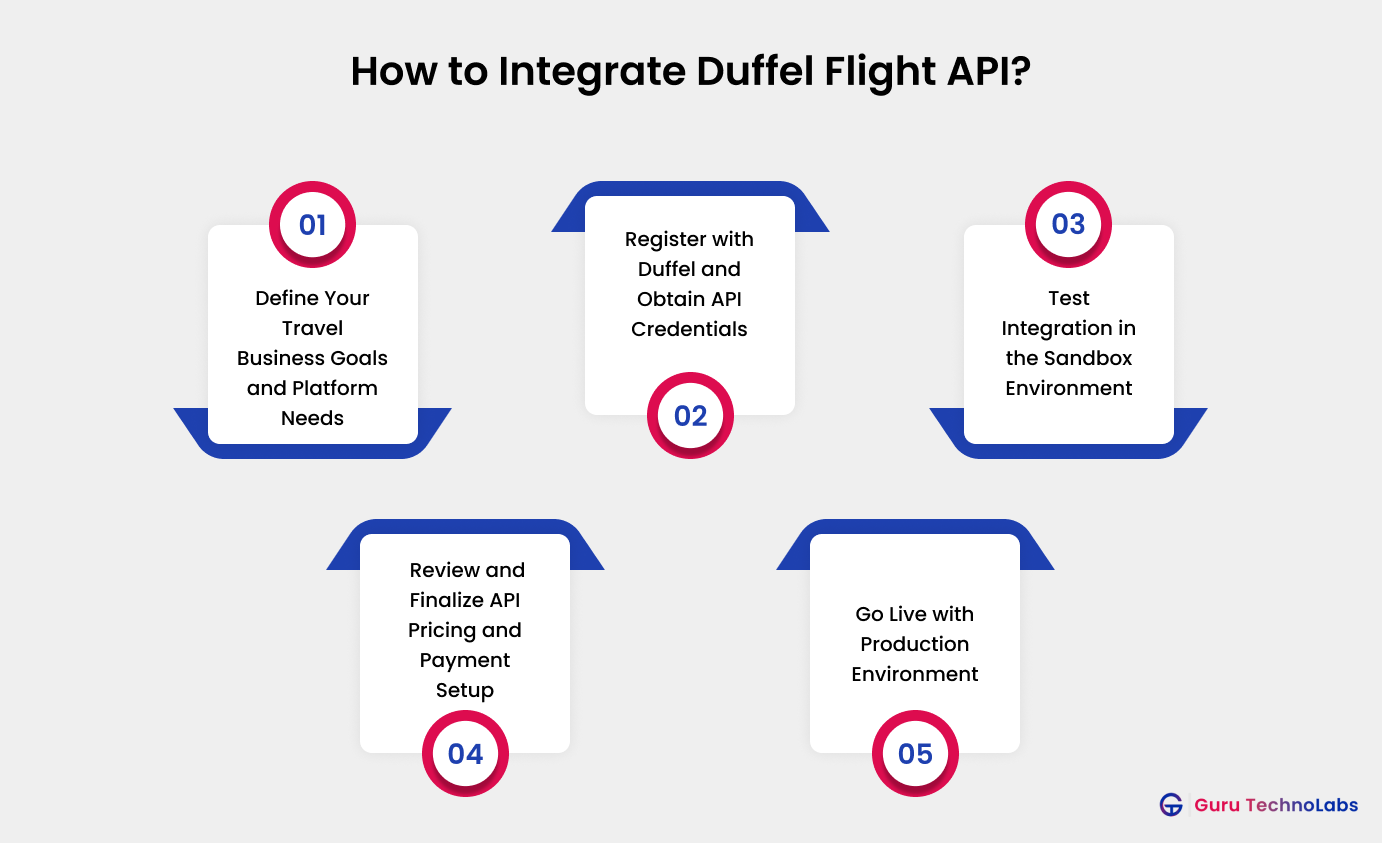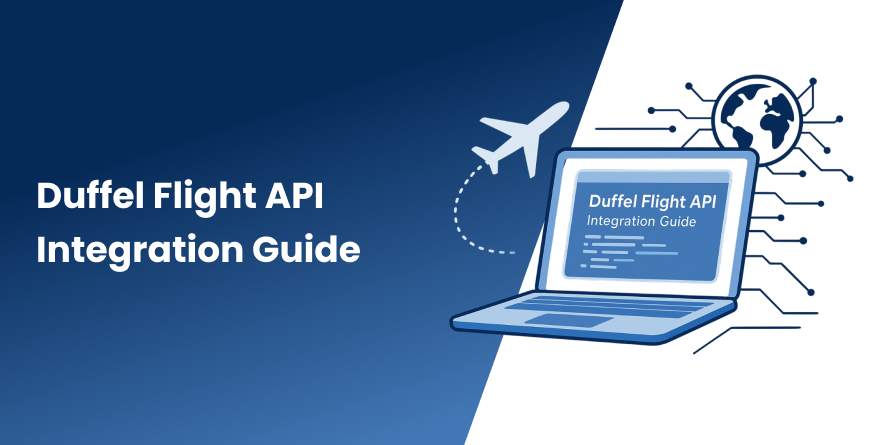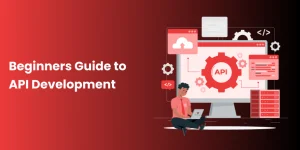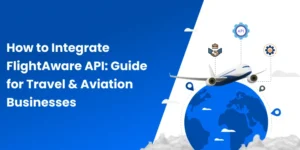The travel industry is rapidly evolving, with technology now driving how people search, book, and experience their journeys. Business travel alone topped $2.09 trillion in 2024, surpassing pre-pandemic levels, showing just how much opportunity there is for travel businesses ready to embrace digital transformation.
Yet, many travel companies still rely on outdated systems that slow down operations, create booking errors, and limit growth. Managing multiple airline connections, updating fares manually, or dealing with legacy software can quickly become overwhelming,
That’s where Duffel comes in. This UK-based company is transforming flight bookings with its modern, easy-to-integrate API that connects airlines, agents, and travelers under one seamless system. With Duffel, travel businesses can offer real-time flight data, instant bookings, and a faster checkout experience without the usual technical headaches.
In this blog, we’ll explore what the Duffel API is, its key benefits for travel businesses, step-by-step integration guidance, pricing details, and common challenges travel owners face. Let’s get started by understanding what the Duffel API is all about.
What is the Duffel Flight API?
The Duffel Flight API is a travel technology solution that lets your business easily add flight search, booking, and management features to your websites or apps. In simple terms, it connects your travel platform directly with multiple airlines through a single, reliable API, giving you access to real-time flight schedules, prices, and seat availability without building separate integrations for each carrier.
Designed for travel agencies, startups, and online booking platforms, Duffel simplifies how you manage flight content. It eliminates the complexity of legacy systems and middlemen, allowing your customers to book tickets instantly with accurate, up-to-date information.
With Duffel, you can:
- Search and compare flights from global airlines
- Display real-time prices and seat options
- Automate bookings, ticketing, and cancellations
- Offer add-ons like baggage and seat selection
-
In short, the Duffel API empowers your travel business to deliver fast, seamless booking experiences, just like major OTAs.
What Are the Benefits of Integrating Duffel API?
Integrating the Duffel Flights API enables travel platforms to modernize the way they handle bookings, pricing, and ticketing – all while offering customers a smoother experience.
With the Duffel travel api, agencies can simplify backend processes and deliver flight options faster, helping them stay competitive in a fast-changing travel market.
1. Broad Airline Coverage
With just one Duffel API integration, our travel business can access hundreds of global airlines. It includes major international carriers and low-cost airlines — all through a single connection. This means you can instantly offer customers more routes, better fares, and wider flight choices without managing multiple airline partnerships.
Duffel continuously adds new airlines (including those offering exclusive NDC fares), and your platform automatically gains access without any extra setup or code changes. Businesses like BizAway have already expanded their flight inventory rapidly through Duffel, connecting with over 20 airlines in one go, proving how simple and scalable Duffel’s network really is.
2. Reduced Time and Complexity
By integrating Duffel API, travel business owners can cut down hours spent on manual fare checks and booking coordination, streamlining operations into a single, automated workflow.
This not only speeds up service delivery but also frees teams to focus on growing their business rather than managing tedious processes.
3. Managed Accreditation & Support
Duffel handles the complex airline accreditation process on your behalf, so travel business owners don’t need to navigate the lengthy approvals themselves.
4. Transparent, Usage-Based Pricing
Duffel offers clear, pay-as-you-go pricing, so travel businesses only pay for the bookings they make. This eliminates hidden fees and makes budgeting predictable while scaling operations.
5. Better Predictability & Lower Upfront Risk
With Duffel, travel businesses can plan operations more confidently, as costs and bookings are transparent. The platform reduces financial exposure by minimizing upfront investments in airline partnerships.
6. Monetization via Ancillaries
Duffel enables selling additional services like baggage, seat upgrades, and travel insurance, giving travel businesses new revenue streams without extra infrastructure.
7. Dynamic Pricing & Personalization
The Duffel API supports real-time fare updates and tailored offers, allowing platforms to provide competitive pricing and personalized options that boost customer satisfaction and loyalty.
Now that we’ve explored the key benefits and real-world value of Duffel API integration, it’s clear how much it can simplify flight booking and enhance your travel platform’s performance.
In the next section, let’s look at how to integrate the Duffel flight API step-by-step, so you can bring these advantages to your own business setup with ease.
How to Integrate Duffel Flight API?
Usually flight API integration sounds complicated, but don’t worry this steps is for you to understand or plan for your duffel api integration without understanding technical expertise.
These integration steps show how Duffel API can be set up efficiently, and by partnering with professional services, travel businesses can achieve a smooth, hassle-free integration without needing deep technical expertise.

1. Define Your Travel Business Goals and Platform Needs
Start by identifying exactly what your platform needs from the API. Are you targeting single-city flights, multi-destination trips, or offering add-ons like baggage and seat selection? Defining your goals helps you tailor the API integration to match your business objectives.
- Identify your target travelers and booking types
- List must-have features vs. nice-to-have features
- Align your API use with the overall business strategy
2. Register with Duffel and Obtain API Credentials
Sign up on Duffel to get your unique API keys, which act as secure access tokens for your system. These credentials are essential for both testing and live operations.
- Access the sandbox and production environments
- Keep credentials secure to prevent unauthorized access
3. Test Integration in the Sandbox Environment
Use Duffel’s sandbox environment to simulate real-world bookings without processing actual payments. This lets you identify and fix issues before going live.
- Test flight searches, availability, and pricing
- Simulate bookings and ticket issuance
- Verify add-ons like seat selection and baggage
4. Review and Finalize API Pricing and Payment Setup
Understand Duffel’s usage-based pricing and set up your payment details. Clear understanding of costs ensures smooth operations when handling real bookings.
- Confirm pricing model and transaction fees
- Link your preferred payment methods
- Ensure invoicing and reporting are ready
5. Go Live with Production Environment
Once testing is complete, move your integration to the production environment. Now your platform can offer real-time bookings, instant ticketing, and accurate pricing to travelers.
- Monitor initial bookings carefully
- Ensure all features work as expected
- Communicate new booking capabilities to your users
6. Monitor Performance and Optimize Continuously
Integration is an ongoing process. Regularly review performance to spot trends, identify issues, and enhance user experience.
- Track booking success rates and API response times
- Optimize workflows for faster processing
- Adjust offerings based on traveler behavior and feedback
Understanding these steps helps you plan your API integration more effectively. Alternatively, partnering with an experienced integration provider like Guru TechnoLabs can help you avoid technical challenges and ensure a smooth setup.
Since cost is another key factor when selecting an API, let’s now take a closer look at the pricing of the Duffel API.
What Is the Pricing of Duffel Flights API?
Understanding the cost structure of the Duffel flight API is essential for travel businesses planning to integrate this powerful tool. The Duffel travel API offers flexible pricing that scales with your booking volume, making it suitable for startups as well as large enterprises.
This approach ensures you only pay for what you use, helping to manage expenses while expanding your flight booking capabilities.
Below is a clear overview of Duffel flights api pricing and how it breaks down.
| Plan | Monthly Fee | Per Booking Fee | Features Included |
|---|---|---|---|
| Starter | Free | $1.00 per order | Basic access, up to 50 bookings per month |
| Plus | $99 per month | $0.90 per order | Up to 1,000 bookings, email & premium support |
| Enterprise | Custom pricing | Custom pricing | Above 1,000 bookings, dedicated account manager, integration assistance |
Key Pricing Details
- Pay-per-booking model: Charges apply only for confirmed bookings.
- Transparent pricing: No hidden costs or surprise fees.
- Custom enterprise options: Tailored plans for high-volume businesses.
- Global currency support: Simplifies multi-country operations.
This tiered model suits businesses at any stage – from testing the API with the free Starter plan to scaling up with custom enterprise support.
Challenges Business Owners Face (and How to Overcome Them)
Travel agency owners often encounter a range of challenges when integrating APIs and managing their platforms. Here, we discuss some common issues in integrating or developing travel portals and how to effectively address them.
API Reliability, Downtime & SLAs
A major challenge is ensuring the API’s reliability. Downtime or slow responses can disrupt bookings, damaging customer trust and business performance.
Service Level Agreements (SLAs) often specify uptime targets, but meeting these consistently requires vigilance.
How to Overcome
- Choose providers with strong SLA commitments and real-time monitoring.
- Using redundant systems and fallback mechanisms ensures continuous operation during unexpected outages.
- A clear communication plan with the API provider helps manage issues swiftly and minimizes customer impact.
Search-to-Book Ratio Limits, Cost Overrun on Searches
Many travel APIs impose limits on the number of search queries, which can lead to increased costs or throttling if the platform generates excessive requests without conversions. This affects both operational budgets and user experience.
How to Overcome
- Optimize search algorithms to reduce unnecessary queries. Cache frequently requested data responsibly without risking outdated info.
- Applying intelligent filters and prioritizing likely booking options can lower search volumes while maximizing conversions.
Regulatory, Compliance, Data Privacy
Operating in multiple regions means abiding by complex legal requirements regarding user data protection and consumer rights. Non-compliance risks, penalties, and damages brand reputation.
How to Overcome
- Implement robust data privacy policies aligned with GDPR and other local laws. Use encrypted data storage and transmission protocols.
- Regular audits and compliance checks ensure that evolving regulations are met.
- Collaborating with professionals in travel API integration guides successful adherence.
Managing Change, Cancellations, Irregular Operations
Irregular operations such as cancellations, rescheduling, and last-minute changes challenge booking software development, often leading to customer dissatisfaction and operational headaches.
How to Overcome
- Incorporate flexible booking management features in your platform.
- Automate notifications and refunds, and maintain real-time synchronization with airline data.
- Clear cancellation and change policies embedded in your travel platform reduce confusion and support smoother customer service.
Why Partnering with an API Integration Provider Matters
Integrating travel APIs like Duffel API can be complex, which is why working with an experienced API integration provider such as Guru TechnoLabs is crucial. From pricing to handling technical challenges and regulatory compliance, we help travel businesses navigate every step smoothly.
With extensive experience in travel portal development and travel booking software development, Guru TechnoLabs has successfully supported many travel agencies, making integration seamless and efficient.
Partnering with a knowledgeable provider ensures access to up-to-date technology, reliable support, and solutions tailored to your needs – helping your business deliver better customer experiences and grow confidently in a competitive market.
Frequently Asked Questions
Duffel offers a free Starter plan that lets you test the API and process up to 50 bookings per month without a fixed monthly fee. Beyond that, charges apply per booking depending on your plan.
Duffel Flight API suits a variety of businesses, from startups and small travel agencies to established online travel agents (OTAs) and corporate travel platforms.
No, Duffel acts as an aggregator and provides access to airline content, so individual airline accreditation or IATA certification is not required to use their API.
YIntegration timelines vary, but with Duffel’s clear documentation and sample code, most businesses can complete setup within a few weeks, depending on technical resources.
Duffel is designed for both - startups appreciate the low-entry barrier and flexible pricing, while established OTAs benefit from its wide airline coverage and reliable technology.
Pricing includes a free tier for limited bookings and paid plans ranging from pay-per-booking fees to custom enterprise pricing based on volume and support needs.
Yes, Duffel delivers real-time access to flight schedules, seat availability, and dynamic pricing from a broad range of global airlines.
Duffel modernizes flight booking with streamlined APIs, real-time booking confirmation, and simpler integration, compared to older, more complex GDS systems.
While an in-house tech team helps, Duffel’s comprehensive documentation and support make it possible to work with external developers or agencies to manage integration successfully.
Duffel primarily charges per confirmed booking, not for search queries, which helps control costs even during high search volumes.



















